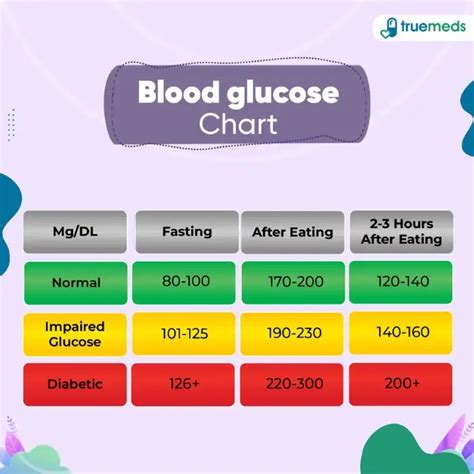Intro
Maintaining a healthy blood sugar level is crucial for overall well-being, as it directly impacts the body's ability to function properly. Blood sugar levels refer to the amount of glucose present in the blood, and it is essential to keep these levels within a specific range to avoid various health complications. The importance of monitoring and managing blood sugar levels cannot be overstated, especially for individuals with diabetes or those at risk of developing the condition. In this article, we will delve into the world of blood sugar levels, exploring the ideal range, factors that influence these levels, and strategies for maintaining a healthy balance.
The human body relies on glucose as its primary source of energy, and blood sugar levels play a vital role in ensuring that cells receive the necessary fuel to function correctly. When we consume food, our body breaks down carbohydrates into glucose, which is then absorbed into the bloodstream. The pancreas produces insulin, a hormone that helps regulate blood sugar levels by facilitating the entry of glucose into cells. However, when the body is unable to produce enough insulin or becomes resistant to its effects, blood sugar levels can become imbalanced, leading to a range of health problems.
Understanding the ideal blood sugar level range is vital for maintaining good health. The American Diabetes Association recommends the following blood sugar level ranges: less than 100 mg/dL for individuals without diabetes, and between 70-130 mg/dL for those with diabetes. It is essential to note that these ranges may vary depending on factors such as age, medical history, and the presence of other health conditions. Individuals with diabetes or those at risk of developing the condition should work closely with their healthcare provider to determine the optimal blood sugar level range for their specific needs.
Blood Sugar Level Ranges

Blood sugar levels can be influenced by a variety of factors, including diet, physical activity, stress, and sleep. A diet high in processed foods, sugar, and saturated fats can lead to increased blood sugar levels, while regular physical activity, such as walking or jogging, can help lower levels. Stress and lack of sleep can also have a negative impact on blood sugar control, as they can increase the production of hormones that raise blood sugar levels. Understanding these factors and making informed lifestyle choices can help individuals maintain healthy blood sugar levels and reduce the risk of related health complications.
Normal Blood Sugar Levels
Normal blood sugar levels are typically between 70-99 mg/dL, although this range may vary depending on the individual and their specific health needs. Fasting blood sugar levels, which are measured after an overnight fast, should be below 100 mg/dL. Postprandial blood sugar levels, which are measured after eating, should be below 140 mg/dL. It is essential to note that these ranges may be adjusted based on individual factors, such as age, medical history, and the presence of other health conditions.Factors That Influence Blood Sugar Levels

Several factors can influence blood sugar levels, including diet, physical activity, stress, and sleep. A diet high in processed foods, sugar, and saturated fats can lead to increased blood sugar levels, while regular physical activity, such as walking or jogging, can help lower levels. Stress and lack of sleep can also have a negative impact on blood sugar control, as they can increase the production of hormones that raise blood sugar levels. Additionally, certain medications, such as steroids and certain psychiatric medications, can affect blood sugar levels. Understanding these factors and making informed lifestyle choices can help individuals maintain healthy blood sugar levels and reduce the risk of related health complications.
Diabetes and Blood Sugar Levels
Diabetes is a condition characterized by high blood sugar levels, which can occur when the body is unable to produce enough insulin or becomes resistant to its effects. There are two main types of diabetes: type 1 and type 2. Type 1 diabetes is an autoimmune condition in which the body's immune system attacks and destroys the cells in the pancreas that produce insulin. Type 2 diabetes is a metabolic disorder in which the body becomes resistant to the effects of insulin, leading to high blood sugar levels. Both types of diabetes require careful management to maintain healthy blood sugar levels and prevent related health complications.Strategies for Maintaining Healthy Blood Sugar Levels

Maintaining healthy blood sugar levels requires a combination of lifestyle modifications and, in some cases, medication. The following strategies can help individuals maintain healthy blood sugar levels:
- Eating a balanced diet that is low in processed foods, sugar, and saturated fats
- Engaging in regular physical activity, such as walking or jogging
- Getting enough sleep and practicing stress-reducing techniques, such as meditation or yoga
- Monitoring blood sugar levels regularly and adjusting treatment as needed
- Taking medication as prescribed by a healthcare provider
Blood Sugar Monitoring
Blood sugar monitoring is an essential aspect of maintaining healthy blood sugar levels. There are several ways to monitor blood sugar levels, including: * Fingertip blood sugar testing: This involves pricking the fingertip with a lancet to collect a blood sample, which is then tested using a glucose meter. * Continuous glucose monitoring: This involves wearing a small device that tracks blood sugar levels throughout the day. * Urine testing: This involves testing the urine for ketones, which can indicate high blood sugar levels.Complications of Uncontrolled Blood Sugar Levels

Uncontrolled blood sugar levels can lead to a range of health complications, including:
- Heart disease and stroke
- Kidney damage and disease
- Nerve damage and neuropathy
- Blindness and vision loss
- Foot damage and amputation
- Skin conditions and wounds that are slow to heal
Preventing Complications
Preventing complications of uncontrolled blood sugar levels requires careful management and monitoring of blood sugar levels. The following strategies can help: * Maintaining a healthy diet and exercise routine * Monitoring blood sugar levels regularly and adjusting treatment as needed * Taking medication as prescribed by a healthcare provider * Getting enough sleep and practicing stress-reducing techniques * Avoiding smoking and limiting alcohol consumptionConclusion and Next Steps

In conclusion, maintaining healthy blood sugar levels is crucial for overall health and well-being. By understanding the ideal blood sugar level range, factors that influence these levels, and strategies for maintaining a healthy balance, individuals can reduce the risk of related health complications. It is essential to work closely with a healthcare provider to determine the optimal blood sugar level range and develop a personalized treatment plan. By taking control of blood sugar levels, individuals can enjoy a healthier, happier life.
We invite you to share your thoughts and experiences with blood sugar levels in the comments below. If you have any questions or concerns, please do not hesitate to reach out. Additionally, we encourage you to share this article with friends and family who may benefit from this information.
What is the ideal blood sugar level range?
+The ideal blood sugar level range is between 70-99 mg/dL for individuals without diabetes, and between 70-130 mg/dL for those with diabetes.
What factors can influence blood sugar levels?
+Factors that can influence blood sugar levels include diet, physical activity, stress, sleep, and certain medications.
How can I maintain healthy blood sugar levels?
+Maintaining healthy blood sugar levels requires a combination of lifestyle modifications, including eating a balanced diet, engaging in regular physical activity, getting enough sleep, and monitoring blood sugar levels regularly.
